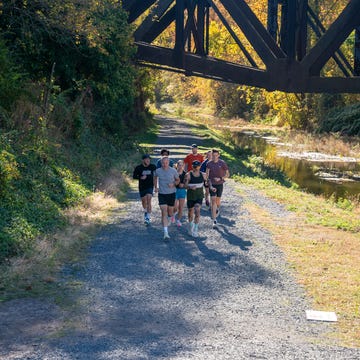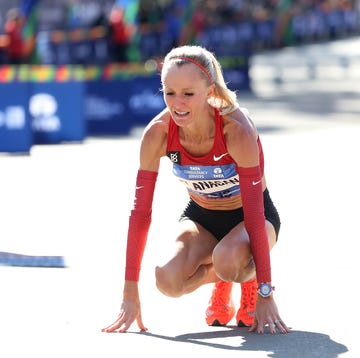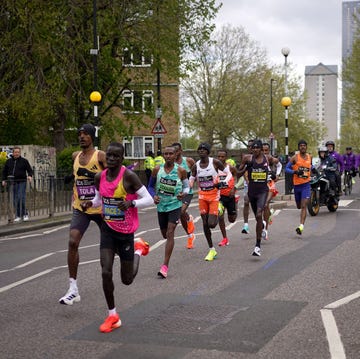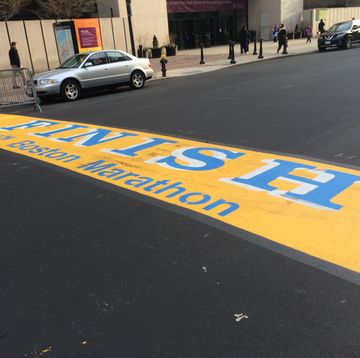"O, what a rogue and peasant slave am I! Is it not monstrous that this player here, But in a fiction, in a dream of passion, Could force his soul so to his own conceit ..." -- Hamlet, Act 2, Scene 2 (Spoken by Hamlet)
Two-time Leadville 100 champion Tony Krupicka? A rogue needn't be a scoundrel or scamp. Many great people who helped make this world a better place were characterized as rogues by their contemporaries. Those who buck prevailing societal notions of what is the norm, those who push the envelope, challenge the standards or otherwise upset the status quo are often revered down the road or, in this case, trail. Which is why the Rogue Valley Runners of Ashland, Oregon -- the rogues of today -- will likely be seen as heroes tomorrow.
How did such a concentrated and eccentric pool of trail running talent trickle into the tiny Siskiyou Mountain hamlet of Ashland, which can rightfully stake its claim as the ultradistance running mecca of the U. S.? What forces worked to bring this band of merry young upstarts together to a town otherwise known for lush old-growth forests, a percolating Lithia water spring and the Oregon Shakespeare Festival?
To get to know this lovable bunch of rogues bound by the joy of long runs on singletrack trails and a happy-go-lucky approach to life, let's look at the playbill.
THE CAST:
Hal Koerner
Playing the lead role in this saga is 33-year-old Hal Koerner, who had the initiative to be an ultrarunner and running shop owner at an age when most are thinking of being a rock star or night club owner. His ultra career was started deliberately, and, with plenty of mentors, he became one of the torchbearers of a new generation of trail fiends.
As a runner, Koerner's torch burned brightest in 2007 when he won the coveted Western States 100, arguably the world's most competitive ultradistance race. He'll defend that title in June (last year's race was canceled because of forest fires), but he's had a lot on his plate with his growing business, the Rogue Valley Runners retail shop, now in its fourth year.
To learn the trade, Koerner moved to Seattle in 2004 to work at Scott McCoubrey's successful Seattle Running Company. Koerner has used Scott's business model as the mold for RVR and is quick to credit him with planting the seed for RVR. He also credits his parents, Hal, Jr., and Diane Koerner, and his girlfriend, Carly Varner, for their support and involvement in the store.
In the informally assembled but ever-spirited and competitive community of Rogue Valley Runners, Koerner plays the big brother role. On the group run that I did with the Rouges this spring, Koerner directed the route without being out front. Anything but bossy, Koerner would merely indicate the route, and the others would adjust their pace at trail junctures. That is Koerner's demeanor at the store as well. His hard-working "employee" friends are motivated by the same work ethic and exuberance they exhibit on the trails. Like Jack's beanstalk, Koerner's just had to add water to these young sprouts and watch them grow.
Koerner credits the success of his store to a balance that prevents him from overtraining and makes him more focused and pragmatic about his racing and, in turn, the racing success has helped keep his business in the public eye. Ashland has a population of only 21,000, but the notoriety garnered among the active locals and the steady stream of tourists allowed the store to double its floor space in the last year. "The limelight of running and racing well in a small town really carries some weight and certainly helps with sales as well as drives awareness for such a great sport and activity," Koerner says. In 2007, Koerner recruited friend and fellow ultra fiend Ian Torrence to be the store's manager, as he felt he "needed someone to come in and feel vested with responsibilities and accountability" for the store to grow. The two had met at the Catalina 100K in 2001, when Torrence was promoting Montrail with Scott Jurek. Koerner came from Colorado with fresh legs and captured Torrence's course record by less than a minute. Torrence won the 50K and, had he not, Koerner doesn't know that they'd have hit it off because Torrence offered him a Montrail sponsorship after the awards ceremony. "But I was much happier to have met and perhaps impressed two guys that I had admired the last few years," Koerner says.
Torrence describes the store as "Hal's vision" and isn't the least bit surprised about its success. "He makes the big decisions, and has the big ideas," Torrence says. "I try and help him get those ideas rolling. Hal likes to see everyone running together, having a good time and reaching to new heights. It's that attitude that has brought us here."
Jenn Shelton, a rising RVR star new to the Ashland scene, describes Koerner as "a maniac, but he's got this compassion that makes him a bit of a big brother figure."
Ian Torrence
If Koerner is the father or big brother of the Rogue Valley Runners, 36-year-old Torrence plays the dual role of uncle and sage -- Shelton describes Torrence as "your sometimes grouchy but always lovable uncle" -- although his nickname among the group is "Race Whore" because he's run almost all the big ultras there are to run (and won quite a few). He's also written dozens of articles about the sport and its characters, managed the Montrail Ultra Team from 2000 to 2001 after learning the ropes from McCoubrey, and become a part of the glue of the sport and the ultra scene.
Torrence may be a race whore, but he likes to push himself with such tests. And the pushing has paid off, as he won 12 of the 16 ultras he ran in 1999, with nine course records, broke Dan Barger's Grand Slam Record in 2002, and has recorded 10 top-10 finishes at the JFK 50 Miler in Washington, D. C. (True to his style, Torrence is somewhat perturbed about the fact that he's still chasing an elusive win there.)
To join Koerner in Ashland, Torrence left his job with a nonprofit in Flagstaff, AZ, where he was doing trail, restoration and mapping work on public lands. As the store manager, Torrence makes sure everything runs smoothly. He loves interacting with the runners and thrives on hearing their stories, helping them with race strategies and dispensing other running-related advice. "I've been around the block -- more than once -- and have experienced most of the issues that crop up in the runner's realm," he says.
It's quite a contrast to the public lands jobs he held in Moab, Las Vegas and Flagstaff after leaving the Seattle-based Montrail headquarters in 2001. Those gigs were tough on his body, so much so that it was affecting his running. "I was suffering physically and mentally," he says. He misses the places he worked and the people he worked with in the Southwest, and admits that if Koerner ever wanted to open a satellite store in Flagstaff or Moab, he'd jump at the opportunity.
"To have someone with Ian's knowledge and experience will certainly help us through the uncertain times," Koerner says. Torrence has helped spearhead the development of a variety of trail races of all distances. Among them are the new Pompador Half Marathon on May 30 and the Nov. 7 Lithia Loop Trail Marathon, which will serve as the 2009 USATF Trail Marathon Championship.
Health & Injuries
Kyle and Erik Skaggs moved from New Mexico to Ashland last year to work for the shop, hearing the siren call of the rogue movement and knowing the benefits of having such great training partners. It's almost comical to liken the Skaggs brothers to the tennis-playing Williams sisters. However, both pairs of siblings are at the top of their sport, tall, talented, and prefer not to compete against one another, teaming up at times to dominate the opposition. From there on, the comparisons are laughable.
Kyle, the younger of the pair at a mere 24 years old, is handsome and understated. He's one of the only single guys among this roguish bunch and gets kidded about the fact that women will come into the store and spend an hour doing a treadmill gait analysis with him and yet leave without a purchase. Or a phone number. Kyle is most known for last year's dominant and meticulous dismantling of the Hardrock 100 course in Colorado, breaking Scott Jurek's mark set a year earlier by almost three hours.
In 2007, Kyle teamed up with older brother Erik, 26, to easily win the first six-day TransRockies Run. Erik returned to notch a second TransRockies win last year, this time teaming with fellow Oregonian Max King, who is an occasional visitor to Rogue Valley Runners. Erik also posted back-to-back wins and a 2008 course record at the Quad Dipsea, the hilly 28.4-miler in the foothills north of San Francisco. Kyle is sometimes confused as the elder of the brothers, something Shelton, Erik's girlfriend, says is because "Kyle has Erik wrapped around his finger so Kyle seems like he is in control and thus older." A comment like that is sure to spark a few snide remarks in the shop, but, given the nature of the characters, it's all in good fun. "Erik's that good-natured guy who you want to hate because he's good at everything but you can't hate him because he's so nice and sincere," Shelton says. "You know ... the most-loved kid in high school ... that's Erik."
Jenn Shelton
If Rogue Valley Runners were the Seinfeld sitcom, 25-year-old Shelton would be Elaine Benes and steal the show with her wit, charm, sassiness, and phenomenal talent. Filling the little sister role, her "backatcha" feistiness comes from being able to not just hang with but, at times, spank the boys. Fittingly, Shelton describes her role in RVR as "the annoying little sister that can't quite keep up and throws tantrums when they leave me on the trail for the millionth time." When asked her best results, Shelton boasts of dropping Kyle on a 12-miler when he had strep throat.
She moved to Ashland from Bend last year, and although she was fast before she arrived, she's only raised the bar thanks to so many caring but also challenging big brothers -- the kind who pick on their little sister but also protect and encourage her. Shelton, who works at a retail shop called Earthly Goods, won the American River Trail 50 by a long shot last spring and ran the 2007 Rocky Raccoon 100-miler in a record-setting 14:57.
"We joke about 'London 2012,' but I don't think that's too far off base for her, ambition-wise," Torrence says about the possibility of Shelton making the U. S. Olympic marathon team in three years. "She's a selfless runner who only likes to run because she enjoys it so much. At the Tahoe Rim 100 Miler last year, she dropped out at 50 miles because she wasn't having fun, but three hours later picked up a runner at mile 75 and paced him into the night. Because, for her, that's fun."
Tony Krupicka
CA Notice at Collection (profiled June 2008 by Running Times) moved to Ashland last year after stints in Montana, Colorado Springs and Leadville. He is, unfortunately, suffering some injuries -- again -- and may not stay in Ashland because he thinks the higher altitude works better for him as effective training ground.
Krupicka's connection to the Rogue Valley Runners dates back a few years to when he met Kyle and Erik, the common bond being they were young, open-minded (and similarly scraggly) ultrarunners in Colorado. Krupicka and his girlfriend, Jocelyn Jenks, followed Kyle and Erik to Ashland last fall for its moderate winter climate. "Kyle and Erik kept on telling me the trails access was excellent and that Ashland is a cool town, and I was ready to check out a different part of the country for a while," Krupicka says. He admits he was drawn to the small-town funkiness of Ashland, which he describes as an "artsy, liberal town with tons of local businesses and very few national chains." He also praises the trails and the fact that they offer some "sweet vertical."
(Tony decided to head back to Colorado in the spring to recover from an injury. No doubt, he'll be back for a cameo at some point.)
SUPPORTING ACTORS
Koerner is the first to admit that he did not bring running to the Rogue Valley. The local running scene has always been vibrant, given the abundance of lush trails that wind through Siskiyou range. He credits Ric Sayre with being the real running pioneer. Sayre, 55, is one of only three runners to have competed in five U. S. Olympic trials marathons. He won 12 marathons in his prime, including the 1986 Los Angeles Marathon, and holds the record for the Mt. Ashland Hill Climb. He joins RVR group runs on occasion, works at the local food co-op and is a vast resource for running routes and local running history.
But what Koerner did bring to Ashland was a new level of competition and camaraderie that has helped pre-RVR residents like Neil Olson, John Leuthold and Todd Ragsdale develop from middle-of-the-packers to local stars. Olson is a medical doctor who won the 2008 Where's Waldo 100K. Leuthold is a UPS driver who had 10 wins last year in local road races. Ragsdale is the produce manager at the Fred Meyer grocery in Medford and, according to Torrence, another "crazy local runner." Other local personalities include Chris Rennaker, a part-time RVR store employee and GIS specialist for the town of Talent, Aaron Brian, who practices law in Ashland, and Maria Clementi, Torrence's girlfriend, who works at an Ashland non-profit called The Crater Lake Trust. Each has made a foray into ultrarunning in the last year or so, thanks to the inspiring influence of the shop and its high-profile but humble staffers.
In addition to these characters, Ashland has become a stopping point in the San Francisco-Eugene-Portland-Seattle ultrarunner pipeline, and it isn't too out of the way from the trail nirvana in Bend. As such, it plays host to many elite trail running visitors, including Scott Jurek, Max King and Susannah Beck. Jurek characterizes the town as the perfect trail running mecca. "It has close proximity to mountain trails and a supportive community," he says. "Ashland has this budding new energy that is really alive." Jurek thinks the locale is just starting to be discovered, which is part of what makes it a fun place to be and train. "Hal and Ian have done a great job of sharing their passion for trail running with the community," he adds. "That excitement is contagious and the energy helps people explore their limits." King, who lives in Bend, enjoys visiting Ashland. He's made a smooth transition from track and cross country to trails and ultras and is grateful for the help from his Ashland friends. "It's been a huge benefit knowing Hal and the Skaggs because of their wealth of knowledge in the field," King says. "I also think we'll start to see younger guys like the Skaggs boys enter the realm of trail and ultrarunning" so that the sport gets more popular and races start to attract more prize money. "I know a lot of people are against that and would like to see it remain the way it is or was, but I think if it's done properly with good people running the show we won't lose the principles that let us escape to the trails."
THE STAGE
Perhaps Ashland's seemingly blissful population finds joy in the local Lithia water, a salty, mineral-infused water that has parallels with ultra-distance running in that both even out manic-depressive qualities by mellowing rough edges and spawning general happiness. For a small community, Ashland's population of ultrarunners is on par with that of Shakespearian actors. Both are highly evolved and skilled at their craft, yet neither are paid very well. A walk down Main Street takes one by spas, bead shops, music stores, "antiques" boutiques that sell Che Guevara posters, crystal and art galleries, used and new book stores, Nepalese importers, earth-friendly shoe and apparel retailers, pottery shops, and an art-deco movie theater. Business is brisk from March to October during the festival, but the local economy slows considerably the rest of the year.
Ashland is the type of town where you see a lot of hybrid cars driven by California retirees who shop at the thriving health food cooperative. Larry and Leslie Mehaffey, with their dog, Leo, fit the bill perfectly. They've been living in town for almost seven years, having moved from Santa Cruz. Semi-retired, Larry works part-time driving school buses and Leslie works at hospice care. They're frequent visitors to Rogue Valley Runners and buy their groceries at the Ashland Food Co-op.
This is a place where pedestrians cross at corners and wait for lights, a municipality where drivers watch for pedestrians in crosswalks and don't tend to run them down. There are approximately 300,000 people in the Rogue Valley and median home prices in Ashland are in the $300,000 to $400,000 range but have dropped 10 percent after doubling from 2001 to 2007. There is a college campus two miles up the valley, where there is a decent track if anyone feels the need to do speed work.
The Rogue Valley Runners shop is a tastefully laid out storefront that is centrally located on Main Street. There is plenty of retail space and in addition to the typical shoes, apparel, books, treadmill with video and energy bars, and there is an equally important component -- the energetic vibe of Koerner, Torrence, the Skaggs brothers, Krupicka, Rennaker, and several other staffers. It has become the running community hub much the way Frank Shorter Sports was in Boulder about three decades ago, like a barber shop or pub, where runners congregate, not only to run, but just to hang out with friends. Group runs, formally held on Wednesdays and Thursdays from the store and informally on the weekends from a variety of places, typically attract between eight and 20 people.
"The funny thing about Ashland is that the deep Oregon running tradition is very much alive here in the Rogue Valley, even though it is such a small town," Krupicka says. "Max made the local Turkey Trot an affair where a 4:06 miler [Trevor Palmer] was running for second and someone as speedy as Erik didn't stand a chance."
AN ACT
On a morning group run from the store this spring, nine of us took off for a chilly two-hour trail run knowing that the early fog would either burn off or that we'd soon run ourselves above it. There was a Koerner, clad in Moeben arm sleeves, running with his dog, Abbey, on a leash and giving Leuthold flak about the color of his old-school tights with a pink stripe.
Erik Skaggs was with us but was suffering from a charley horse he received the night before while playing basketball with Krupicka, his brother, Shelton and Jenks. Shelton ribs him but Kyle shows genuine concern and drops back to make sure he's OK. Koerner isn't too worried and hurdles the cattle fence blocking the trail. The coniferous scent pervades the morning air as we skirt the edge of town along the only flat surface we've run on all morning. Shelton has to pee, and we hardly wait. She catches us quickly and then rips into us for not waiting.
These are the easy times that allow those cherished conversations to flow during long runs among peers who share respect and admiration for one another. They are a simple part of the thousands of miles of hard work and effort, where excellence and rogue behavior evolve to the norm and ultrarunning reaches a new and higher level.
ADAM W. CHASE is the Trail Editor for Running Times.













